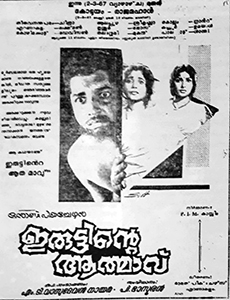Iruttinte Athmavu
1967 Indian film From Wikipedia, the free encyclopedia
Iruttinte Athmavu (transl. The soul of Darkness) is a 1967 Indian Malayalam-language film directed by P. Bhaskaran and written by M. T. Vasudevan Nair based on his own short story of the same name.[1] It stars Prem Nazir and Sharada in lead roles with Thikkurissy Sukumaran Nair, P. J. Antony, Ushakumari, Kozhikode Shantha Devi and Baby Rajani in supporting roles. The film is about a mentally unstable youth born into a matriarchal family who is forced to live as a mad man in chains and who is misunderstood and ill-treated by everyone except his uncle's daughter.[2] The film features music by M. S. Baburaj, cinematography by E. N. Balakrishnan and editing by G. Venkitaraman and Das.
| Iruttinte Athmavu | |
|---|---|
 | |
| Directed by | P. Bhaskaran |
| Written by | M. T. Vasudevan Nair |
| Produced by | P. I. Muhammed Kasim |
| Starring | Prem Nazir, Sharada, Thikkurissy Sukumaran Nair, P. J. Antony, Ushakumari/Vennira Aadai Nirmala, Kozhikode Shantha Devi, Baby Rajani |
| Cinematography | E. N. Balakrishnan |
| Edited by | G. Venkitaraman , Das |
| Music by | M. S. Baburaj |
Production company | Sony Pictures |
| Distributed by | Bharath Pictures |
Release date |
|
| Country | India |
| Language | Malayalam |
Prem Nazir played the mentally challenged Bhranthan Velayudhan, widely considered to be one of the finest performances of Prem Nazir's career.[3][4][5] Nazir himself rated his role of Velayudhan in Iruttinte Athmavu and as the swashbuckling folk hero Thampan in Padayottam as his best.[6] Also, its script is regarded as one of the finest by M. T. Vasudevan Nair. A landmark film in Malayalam cinema, the film provided Malayalam cinema with a new direction; that of the low-budget film. The film has earned a dedicated cult following. It won the National Film Award for Best Film on Other Social Issues.[7][8] It missed the Best Film and Best Actor (Prem Nazir) award only narrowly.[9] Despite all the acclaim, the film was a box office failure.[10]
The film was part of MT's trilogy of political melodramas – the other two being Murappennu (1965) and Asuravithu (1968), both directed by A. Vincent.[11] Major indoor parts of the film were shot in Satya Studios in Madras and outdoor parts from the premises of Bharathapuzha at Shoranur.
Cast
- Prem Nazir as Bhranthan Velayudhan
- Thikkurissy Sukumaran Nair as Madhavan Nair (Karanavar)
- P. J. Antony as Gopalan Nair
- M. S. Nampoothiri as Muthachan (grandfather)[12]
- T. S. Muthaiah as Rajan
- K. Balaji as Chandran
- Sankaradi as Achuthan Nair (house servant)[12]
- Adoor Bhasi as Guru Kunhichathu
- Kaduvakulam Antony as Jyotsyan (astrologist)
- Baby Rajani as Unni
- Sharada as Ammukutty[8][13]
- Ushakumari/Vennira Aadai Nirmala as Prema
- Kozhikode Shantha Devi as Parukkutty Amma (Velayudhan's mother)[14]
- Philomina as Meenakshi Amma
- Padmini as Nani
- Shobha as Malini
- Seleena as Neeli
- Rugmini as Karthi
Soundtrack
The music was composed by M. S. Baburaj and the lyrics were written by P. Bhaskaran.[15][16] All songs in the film were sung by S. Janaki, which is a landmark.
| No. | Song | Singers | Lyrics | Length (m:ss) |
|---|---|---|---|---|
| 1 | "Ambaadikannanu Mampazham" | S. Janaki | P. Bhaskaran | |
| 2 | "Eeranuduthukondambaram" | S. Janaki | P. Bhaskaran | |
| 3 | "Irukanneerthullikal" | S. Janaki | P. Bhaskaran | |
| 4 | "Vaakachaarthu Kazhinjoru" | S. Janaki | P. Bhaskaran |
Writing
The film is scripted by M. T. Vasudevan Nair based on his own a short story with the same name. The screenplay is regarded as one of the finest by the noted writer.[17] A part of the screenplay of Iruttinte Athmavu is being taught in school classes while the complete screenplay is being taught at degree level.[18][19]
Legacy
The film is considered one of the best Malayalam films ever made, it is still critically acclaimed even 50 years after its release.[20] The film remains one of the most influential films in Malayalam film history.[17]
References
External links
Wikiwand - on
Seamless Wikipedia browsing. On steroids.
